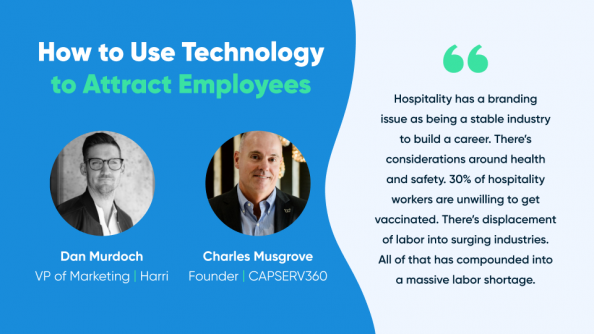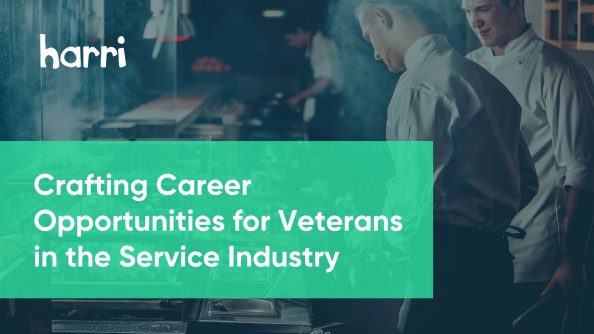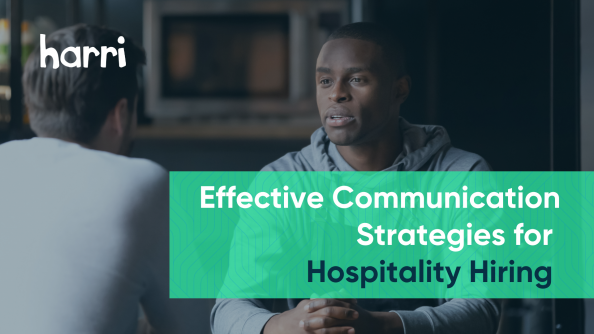5 Ways to Keep the Frontline Workforces Moving Forward
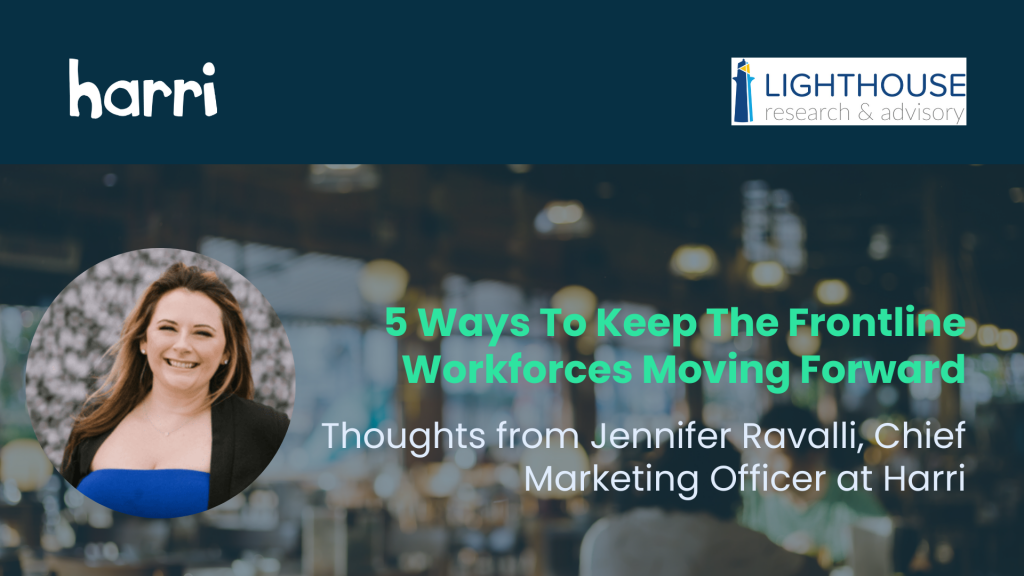
- By Harri Insider Team | June 23, 2023
Frontline workers want to feel seen, leaders are faced with mounting costs, and managers are in the middle of balancing it all.
It’s easy to speak about how we can do more, and do better for our employees and managers. In reality, it’s difficult to balance the interaction of labor costs, productivity, and employee turnover in today’s environment.
However, when we are able to achieve that balance and stop the leaking bucket of labor costs and find new ways to energize our workforce, it gives us a clear path to optimal business growth.
New Research Points to a Fresh Outlook for Hospitality
I often reflect on my time as a server and hostess early in my career and I bring that with me as I think about what drives the feelings, thoughts, and actions of today’s frontline. As I’ve listened to our customer’s challenges and reflected on my own experience as a frontline worker, I wanted to dig more into what truly drives the frontline staff in this post-pandemic environment.
We partnered with Ben Eubanks, the Chief Research Officer at Lighthouse Research & Advisory, to publish new research on just that – titled Flexibility, Support, and Tools: How the Frontline Workforce Experience is Evolving. It looks beyond the trends that shape the sector and dives into the actionable insights and opportunities for employers. As I read through, I found even more validation that the key to retention is delivering a guest experience that will never exceed the employee experience. I saw some excellent alignment with Harri’s work and how our customers think differently about the impact of the employee experience. We continually see approaches evolve around the ongoing need for flexibility and consideration of what motivates today’s talent.
Below are five takeaways that are particularly valuable for hospitality leaders and executives to implement differentiated talent acquisition and retention strategies.
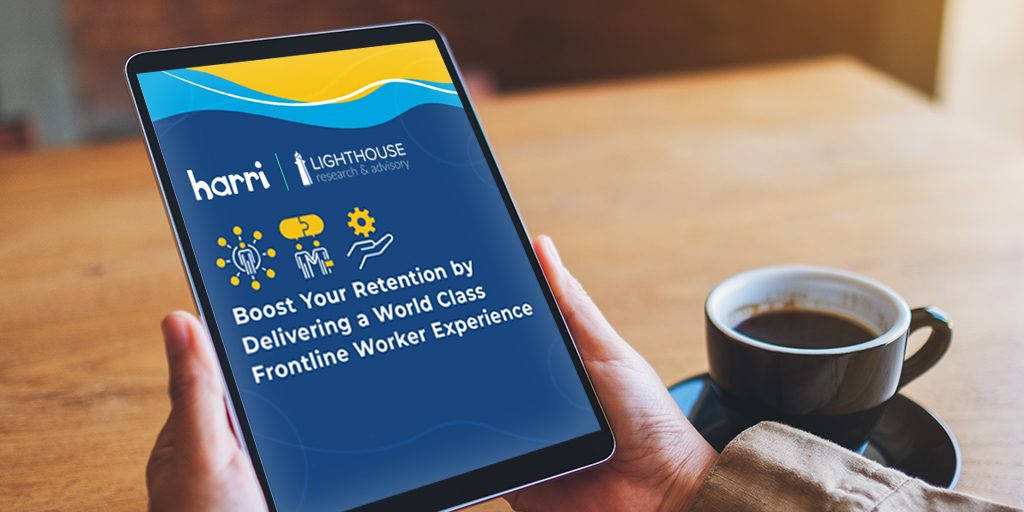
5 Significant Shifts in the Frontline Employee Experience
1. Hiring is an Operational Priority
7 in 10 talent leaders say that hiring went from a recruiting priority to an operational priority in the last year.
Today’s workers join organizations that feel intentional and showcase a purpose they feel aligned to. They also look for those values during their employment experience and are much more likely to jump ship if they lack consistency. A clear and meaningful employee value proposition is a key differentiator as talent shortages continue to challenge the frontline workforce.
Factors at play include:
- Fewer people entering the workforce
- Record high quit rates
- Increased stress and mental health challenges at work
- Candidate ghosting and no-shows.
A differentiated talent experience helps your workers feel a stronger connection to their work and the people they do it for, so you grow a more resilient and loyal workforce.
2. Today’s Talent Crave Understanding
Only half of the frontline workers think they are treated equitably with corporate staff.
People want to do their best work. They also want to make money when they want, how they want, and feel understood in the way they perceive corporate staff to be supported. Hospitality leaders can use their own experiences with frontline work and the data we’re bringing you directly from today’s talent to make decisions from the lens of your people and foster a culture of belonging.
We see that workers who genuinely feel they belong are:
- 4x less likely to have faced mental health declines this year
- 2.5x less likely to quit their job
- 5x more likely to recommend their employer as a place to work.
The time you invest in deeper relationships can also be a direct route to retaining talented individuals and acquiring like-minded candidates that share their good experiences.
3. There Are New Expectations for Frontline Managers
The absence of a supportive manager increases the likelihood of frontline employees quitting their job by 4x.
Leaders can successfully craft the work experience that unleashes each employee’s best work with a closer look at what each individual needs. People want to be seen for who they are today and where they’re going in the future. Managers can take simple, yet meaningful actions by recognizing moments that matter, such as a year-one anniversary for frontline workers who may not always receive that acknowledgement.
The intelligence available through technology, such as predictive reporting on turnover, increases your ability to understand employee sentiment in a very realistic way. That knowledge base and skill set to enable honest conversations help your managers give thoughtful performance reviews. It also helps them go the extra mile with regular check-ins to listen and discuss job aspects like pay transparency, hiring actions, workplace flexibility, and internal mobility that make all the difference.
4. Flexibility Has a New Definition for the Frontline
According to frontline workers, “when I work” is their number one priority when it comes to workplace flexibility.
Today, candidates are exposed to a worldwide network of gig and freelance job opportunities that only grow. Work-life balance is a top driver of employee experiences, and frontline workers aren’t afraid to outline what that means in 2023.
In my own frontline experience, I remember just hoping that my time off requests would be considered, as I balanced the other hats I wore in life. Today, employers have the tools to set clear expectations about things like availability and accommodate more nimble lifestyles for workers before they look elsewhere. The flexibility also circles back to help managers fill shifts when they need it.
Frontline workers want the flexibility to choose :
- When they work
- How they get their work done
- Training or growth opportunities
- Where they work
- Benefits
- How they share ideas and suggestions.
The common thread is the power of choice. It takes someone who comes in for shift work to get the job done and leave, and turns them into a motivated worker that feels their needs are recognized and their employer champions them.
5. Technology Directly Impacts Experience
Employees are 50% more likely to agree that their company gives them access to the right tools and technology at work if they have access to those resources on a mobile device.
Open communication with frontline workers is key to establishing your employee experience. They want to form more connections with the work they do through their phone and crave ways to share feedback. You can create those connection points through communications that are already happening and house every component of the experience in a consistent place.
Imagine the impact you might have on the employee experience when everything from training, shift swapping, and schedule tracking to open feedback forums are all accessible from someone’s pocket. The argument for mobile apps and a consistent place to access information is strong. Still, we also saw that access to technology and tools increased worker perception of the company’s openness, transparency, and fairness.
Access to the right tools to manage their work life is a high-quality retention strategy with benefits that expand well into operational efficiency.

Hospitality Leaders Regain Control With the Right Platform
I hope these fresh perspectives give you more information to support your people and bring out the very best they have to offer. As leaders in a fast-changing era of technology and personalized experiences, knowledge is everything.
Curious about how Harri can keep you on top of it all? Chat with our team today to learn how our unparalleled employee experiences drive business performance for over 50,000 restaurant and hotel locations globally.
Jennifer Ravalli joined Harri in July 2022 as Chief Marketing Officer. An award winning executive, Jennifer is an experienced marketing and business unit leader who specializes in creating scalable efficient growth engines for technology companies. As Vice President, Marketing at PandoLogic, she led the company’s growth strategy, ultimately taking the business from $30 million to $200 million in revenue in 18 months, successfully exiting the business to strategic buyer. Jennifer spent six years in various roles at The Outback Steakhouse early in her career and joined Harri to make a difference in the lives of frontline teams whose needs are often overlooked by traditional HR Technologies.

Previously she held leadership positions at iCIMS and ADP in roles focused on high growth and innovation. She frequently writes and speaks about issues facing women in leadership and the HR Technology landscape. Jennifer is a member of Chief, an organization focused on connecting and supporting women leaders. She holds a B.S. degree in Mass Media Communications and Marketing from New York University.












